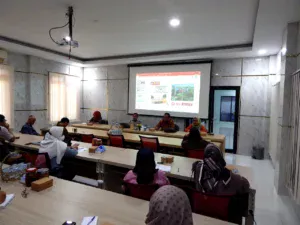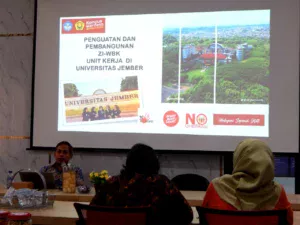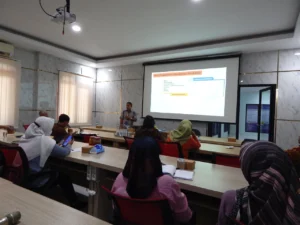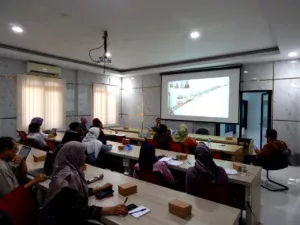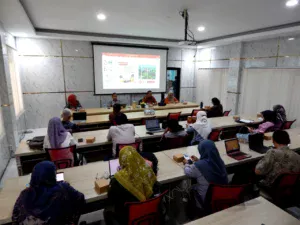 The Faculty of Mathematics and Natural Sciences, University of Jember, presented the Head of ZI, Faculty of Law, UNEJ, Yusuf Adiwibowo, S.H., LL.M., at the Socialization of Improving the Implementation of the Integrity Zone (15/10). Yusuf shared his views and experiences in building the integrity zone at the Faculty of Law, UNEJ. He said that there were several strategic steps that FMIPA had prepared in order to achieve the status of the Corruption-Free Area Integrity Zone (ZI-WBK) from the Ministry of PANRB. The initial foundation for building ZI is a change in organizational culture. “Changes in mindset and work culture are the initial foundations for building ZI,” he said.
The Faculty of Mathematics and Natural Sciences, University of Jember, presented the Head of ZI, Faculty of Law, UNEJ, Yusuf Adiwibowo, S.H., LL.M., at the Socialization of Improving the Implementation of the Integrity Zone (15/10). Yusuf shared his views and experiences in building the integrity zone at the Faculty of Law, UNEJ. He said that there were several strategic steps that FMIPA had prepared in order to achieve the status of the Corruption-Free Area Integrity Zone (ZI-WBK) from the Ministry of PANRB. The initial foundation for building ZI is a change in organizational culture. “Changes in mindset and work culture are the initial foundations for building ZI,” he said.
He also mentioned the importance of strengthening accountability, supervision, and improving public services. “Strict supervision and measurable accountability will encourage the achievement of the integrity zone,” he continued. Transparency and openness must also be implemented in order to create a work environment free from corruption. Yusuf also presented several things that have been implemented in building ZI at the Faculty of Law, UNEJ. The socialization event was attended by the ZIWBK-WBMM team and the leadership of FMIPA, UNEJ.
Previously, Prof. Drs. Dafik, M.Sc., Ph.D. Dean of FMIPA UNEJ, conveyed the initial insights that need to be understood by the FMIPA team in order to prepare for the development of ZI towards WBK. “We need to understand the purpose of developing ZI towards WBK is the support of the Indonesian government’s bureaucratic reform program,” he said. The Dean also invited the entire team to prepare to build ZI after gaining insights and views from the speakers.
In his presentation, Yusuf also conveyed the areas of change in ZI. The right people are needed in each area of change. After that, it was continued with the stages of ZI development towards WBK. It was closed with a joint discussion regarding the challenges that might be faced in ZI development as well as the traditions that have occurred in FMIPA. Also opportunities related to public service innovation and strategies for improving the quality of internal supervision.

